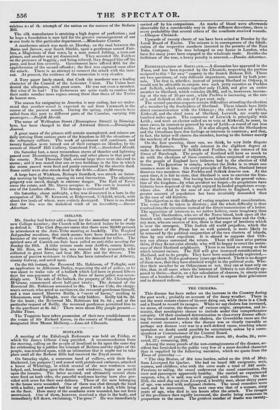REPRESENTATION OF SIIETLAND.—A discussion has appeared in the Times, and
has been repeated by the Chronicle, respecting the portion assigned to this "far awn' " country in the Scotch Reform Bill. There
are two questions, of very different importance, mooted by both jour- nals. The first is, whether, instead of joining Shetland to Orkney, it would not be advisable to conjoin two such petty counties as Peebles and Selkirk, which contain together only 17,400, and give an entire member to Shetland, which contains 29,392, and is, Moreover, increas- ing at the rate of 10 per cent., while Peebles is increasing at the rate of 5, and Selkirk at the rate of 2 per cent. only. The second question respects certain difficulties attending the election of a member by the freeholders of Shetland. These islands have little direct communication with the Orkneys; the chief town of which, • Kirkwall, and the chief town of Shetland, Lerwick, are nearly one hundred miles apart. The commerce of Lerwick is principally with
Leith ; and were an elector called on to vote at Kirkwall, he must, in most cases, be content to proceed by way of Leith—a round of not less than five or six hundred miles. It is also alleged, that the Shetlanders and the Orcadians have few feelings or interests in common ; and that, in filet, the latter will choose the member, leaving to the former merely the mockery of a franchise. On the first question, there can, we think, be very little disputo among Reformers. The only interest in the slightest degree at stake in the settlement of Selkirk and Peebles, is the interest of his Grace of Buccleugh. The people of Scotland will have as much to do with the elections of these counties, either conjoined or separate, as the people of England have hitherto had in the election of Old Sarum. The question is simply, whether the Duke is to retain one nominee more or less. On every principle of Reform, Shetland better deserves two members than Peebles and Selkirk deserve one. At the same time, it is fair to state, that Shetland is now to exercise the fran- chise for the first time. Not having been included in the general valua- tion of the kingdom—by what accident we forget—its proprietors have hitherto been deprived of the right enjoyed by landed proprietors every- where else. And in the case of new districts in England, a much greater amount of population has been invariably demanded. than in the case of old districts.
The objection to the difficulty of voting requires small consideration. The votes will be taken in districts ; and the whole difficulty is thus resolved into the circuitous instead of the direct transmission of a letter. The opposition of interests is, we rather believe, more imaginary than real. The Shetlanders, who are of the Norse blood, look upon all the Scotch with something of contempt ; and between them and the Ork- ney men, who are nearest of kin, there is that anger of brethren which is ever the strongest. This foolish old world prejudice, which the great author of the Pirate has so well painted, is more likely to be removed by the political conjunction of the two clusters of islands, than by any other expedient. It is absurd to suppose that Ork- ney can always command the return. There will soon arise parties there, if they do not exist already, who will be happy to court the assist- mice of their Shetland neighbours. There is no bond so strong as that which interest twines. The Bill will give increased consideration to Shetland, and to its people. They have been scandalously neglected,— as Mr. Patrick Neil a good many years ago showed. There is no danger of them now, that they have obtained weight in the political scale. Whe- ther their member be an Orkneyman or not, they can at least rely on this, that, in all eases where the interest of Orkney is not directly op- posed to theirs—that is, on a fair calculation of chances, in ninety-nine. cases of a hundred—they will have a friend to expose their grievances and to demand redress.



























 Previous page
Previous page